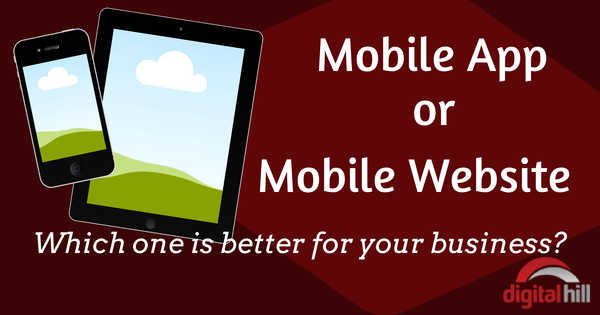Mobile App or Mobile Website: Which is right for your business?
Here at Digital Hill, besides developing top notch websites, we develop Apps for iOS and Android devices. When meeting with potential clients, we commonly hear them say they need an App for their company. In some cases, they do, and in some cases they would be better-suited to use a mobile website.
What’s the difference and how do you know what to use?
Mobile App or Mobile Website
Mobile Website:
A mobile website is a site that you can view on a smartphone or mobile device. It is essentially another website, just built for mobile viewing.
It requires a connection to the internet to use. Mobile websites are often less costly to develop than a mobile app. Almost anything that can be done on a regular website can be done on a mobile website. A mobile website will work on any smartphone with a browser.
- Mobile site reaches more people
- Less cost
- No download required
- Analytics friendly
- Less red tape in development
One disadvantage of a mobile website versus is an app is that there is no ability to send “push notifications” via a mobile website like you can with an app. More on that below!
Mobile App:
Mobile apps can be downloaded from the an App store (iTunes, Google Play, etc.) for free, for a fee, or privately used by a company for various tasks.
With a mobile app you have some decisions to make such as:
- Do I want the app to work on all mobile iOS devices such as iPhone, iPad?
- Do I want my app to work on Android devices or Windows devices?
The answer depends on your needs and the devices that your users use. Google analytics can give you a breakdown of the types of devices your web visitors use.
You also need to choose if the app needs to work with or without Internet connectivity. Mobile apps often work when not connected to the internet. However, some mobile apps still need internet access to keep updated with current information.
A key benefit of an App is the integration with the smartphone operating system. Since the app is developed within the ecosystem of the store (Apple / Android), it enables added features.
You’ve likely seen app notifications in a smartphone that alerts you to a message or update.
This allows a business to “get in front” of the user and be “top-of-mind”.
A good example of a hybrid type app that is used more internally would be a salesperson at a tradeshow. They might want to show off their latest product without messing with a slow busy internet connection. In this case the app could show all the product details to a potential client and never be connected to the Internet. The salesperson could also input prospective client data into the device, and then when he was able to connect to the web, upload that data to a central company database or website.
- Better user experience
- May require a submission process user will have to download to use.
- Faster and more interactive
- Users spend 4X more time on an App
- Device integration(camera, geolocation, voice and motion controls)
- Push notifications
There is no reason a business can’t have both, a mobile app and a mobile website. 81% of business owners recognize that they could benefit from both!
By 2015, 780 million people will be mobile only users and not own a desktop or laptop computer!
Contact Digital Hill or your web developer to find out which is right for you!
Source: http://barnraisersllc.com/2013/08/mobile-app-mobile-website-14-decision-makers/




